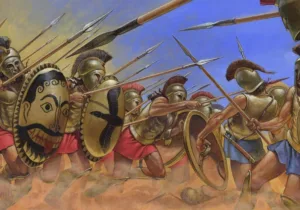If you read a lot of fantasy, are in touch with pop culture, or have simply been watching Game of Thrones, you may have noticed that the fantasy genre in these last few decades has been moving progressively away from its founding themes. The Hobbit and The Lord of the Rings by JRR Tolkien, essentially the founding documents of epic-fantasy, are quite often considered by many modern critics to have a simplistic, black and white view of morality. Detractors of Tolkien and his imitators often say that the moral issues in Middle-Earth are not at all historically realistic. They go as far to say that Tolkien, like most writers of his time, just didn’t understand the nuances of morality, and instead opted for a simple, fairytale view of the world. George RR Martin, writer of the series A Song of Ice and Fire (which was adapted into the exceedingly popular HBO show Game of Thrones) and a pioneer of gritty, more ‘realistic’ fantasy said the following on the subject:
The war that Tolkien wrote about was a war for the fate of civilization and the future of humanity, and that’s become the template. I’m not sure that it’s a good template, though. The Tolkien model led generations of fantasy writers to produce these endless series of dark lords and their evil minions who are all very ugly and wear black clothes. But the vast majority of wars throughout history are not like that.
We have to remember Tolkien fought on the front line of arguably one of the most painfully grim wars in human history; whereas, Martin refused military service. Tolkien, too, doubted the narrative of the ‘holy war’ in WWI, but he believed that it was all part of a greater struggle between good and evil. Joseph Loconte, a senior editor at Providence and associate professor of history at The King’s College in New York, writes in his excellent book, A Hobbit, a Wardrobe, and a Great War, this about Tolkien’s experience in an assault on Ovillers-la-Boisselle:
The next day they were at it again, exchanging bombs, hand grenades, and machine-gun fire with the enemy. The assault lasted all day. The ground, according to one survivor, was “torn up by shells and littered with dead bodies.” At sunset a white flag appeared at the German garrison at Ovillers: surrender. Tolkien, unharmed but physically and emotionally exhausted, had endured fifty hours of combat. Years later he described this experience as “the animal horror of the life of active service.”
Of course the war of the ring is not an accurate portrayal of the typical medieval military conflict, but that isn’t the kind of war it’s intended portray. Middle-Earth, like the real world, did portray battles fought for money and power (for example the Battle of the Five Armies was fought over plunder from the defeated dragon, Smaug). But the war shown in The Lord of the Rings is something unusual. The War of the Ring isn’t just one more morally ambiguous military conflict like Martin’s War of the Five Kings (a succession battle), but rather it is meant as an embodiment of the eternal war between good and evil. It’s not fair to fault Tolkien’s work for failing to portray something like the standard ‘wars of the princes’ which are fought for coin and personal ambition, when that’s not the kind of war his story is about.
George RR Martin is a good example of Tolkien’s ideological critics (despite the fact that Martin is very much a fan of Tolkien’s works stylistically). One of the most telling examples of the philosophical difference between Tolkien and Martin is found in the contrast between the characters Samwise Gamgee and Samwell Tarly. Samwise Gamgee represented Tolkien’s view of his fellow British compatriots in the Great War, as hobbits in general represent the English. He was a small man thrust into a war far larger than himself, but nonetheless brave and persistent in his journey to a terrifying foreign land, bound to his comrade, Frodo, by honor, loyalty, and companionship to the end.
Although Samwell Tarly is to some degree an homage to Samwise, Samwell is not nearly as noble a character: he was thrust into a war in a dangerous foreign land against his will by an unloving father; he’s a coward, and seems at first to follow Jon only out of self-interest. So if Martin’s books are an attempt to respond to Tolkien, by being more realistic and historically grounded, then surely that means George must see Samwell as a more realistic version of Samwise.
If one spends time in the amateur writing community on forums, reviewing others’ work and so on, one finds a certain consensus around moral relativism and this specific brand of ‘realism’ (ironically, most even think themselves unique for it). The science-fiction and fantasy community seems to have decided that the morality portrayed in Tolkien’s books is a simplistic, ahistorical relic of the past.
But, as we’ve seen, Tolkien, of all people, wasn’t oblivious to how terrible the world can be, having been on the front line of the First World War where all but a few of his friends perished. And, more importantly, the philosophy underlying The Lord of the Rings was not merely a reflection of the way people thought back then. The truth is entirely the opposite: the First World War hit Europe hard, and caused people to question everything western. Tolkien was making a statement against an increasingly unromantic, secular world. Europe was starting to question Christianity, and whether words like good and evil actually meant anything at all. The writers of the time left the war open to the new ideas of Communism, Fascism, and Eugenics. But Tolkien, for his part, remained brave and persistent in his beliefs. He believed in a much greater war: the war between the forces of good and that hideous strength that seeks to end civilization and humanity. He believed that there is good left in this world, and it’s worth fighting for. Tolkien said what he meant; the struggle between good and evil in The Lord of the Rings was not a mistake, nor was it an accident of history. It was a bold counter-cultural message of hope from out of the abyss of war to the post-war Europe.
—
Jerry Bowyer is a Forbes contributor, contributing editor of AffluentInvestor.com, and Senior Fellow in Business Economics at The Center for Cultural Leadership.
Jack Lewis Bowyer works in the communications department of Bowyer Research.
The latter was named after C.S. (“Jack” to his friends) Lewis by the former.
Photo Credit: Still of Daenerys Targaryen (Emilia Clarke) with her Unsullied army from Game of Thrones, Season 3 Episode 24. Source: HBO.





